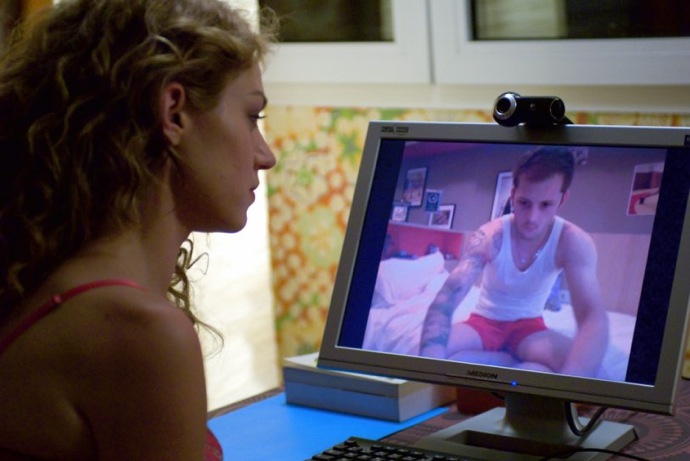
Anti-Semitism is a problem in Europe. Jewish hate crimes are not uncommon and many of the recent crimes have been committed by European Muslims. Nazi and Fascist groups, while tacitly illegal and still in a minority, are on the rise in Eastern Europe. While the crimes and ideological hatred must be addressed, it seems as though many European filmmakers feel the only way to stay relevant—and to gain international appreciation for their films—is to deal, however indirectly, with the subjects of anti-Semitism and the Holocaust. Sometimes it is genuine guilt and sometimes it is opportunism. It is always a slippery method of politicizing film; making films part of the so-called Jewish Question. The Girl on the Train is a film that falls in to the Jewish Question category.
The first questions that come to our minds are not about Jews or guilt or opportunism. They are about color, quirkiness and the French film style; or what’s left of it. The opening credit sequence—both vigorous and simplistic—is from the point of view of a train passing through a dark, winding tunnel. When it comes out in to the light, a mesh of greenery and sunlight that will stay consistent throughout the film startles us. Jeanne (Emile Dequenne) lives with her mother (the reliable Frenchwoman Catherine Deneuve) in a cozy house outside Paris surrounded by shrubbery. Jeanne is a red-haired girl who likes to rollerblade, listens to music on her headphones and looks like she means mischief, chiefly because she does. She meets a sketchy boy in a thrift store named Franck (Nicolas Duvauchelle) who cons a suitcase for her and takes her out for coffee. Jeanne is looking for a job for the summer, but just as she gains employment with a wealthy Jewish lawyer Samuel Bleistein (Michel Blanc), who has something of a romantic history with her mother, she decides to take a job guarding the warehouse of a friend of Franck’s. Because we know that Franck is no good, the situation cannot be good either.

This first half of the film (the film is divided in to two chapters) is a boisterous game of cinematic sleekness, both thematically and visually. When Franck tries to con Jeanne and her mother with a marriage proposal to Jeanne at dinner, the wall behind him is decorated as a false desert paradise scene. When Jeanne and Franck Skype with each other, their typed words are superimposed over their faces; her’s giddy, his selfish and distant. There is something in this renegade boy-girl love story that echoes Godard, and the various plot elements—Franck is an aggressive wrestler, Jeanne is something of a devious female and they get mixed up in a drug ring—suggest some teenage version of Film Noir. The most stunning piece of cinema in the whole film comes somewhere near the end of the first half; Franck and a junkie engage in a struggle in the warehouse ending with Franck getting stabbed in the stomach and the junkie running off with some drugs. It is shortly after this point, however, that director Andre Techniche (is it no mistake that his name sounds like “Technique?”) pulls the plug on genre and technique. The film becomes a fable about pathology, political incorrectness and the need (lust?) some people have for offending acts.

The Girl on the Train is actually drawn from a true story about a French girl who made up a story about being attacked by a group of youths who believed she was Jewish. She was later forced to admit that she had lied, provoking outrage across the nation and in the media. But there is no sense in explaining how the zestful first half connects with this central plotline, in part because there is no explicit connection. It becomes beside the point; Techine wants to explore how humans are complicit in drawing themselves in to danger, and how they consciously perpetuate further danger for themselves and society. We know that Jeanne has a penchant for lying, but still we wonder; what is wrong with this girl? Techine and his screenwriters Odile Barksi and Jean-Marie Bassett appear to take the view that it is not society makes people think in such ways, but the individuals themselves. Jeanne is an individual who finds a certain hedonism in lying. Still, the second half collapses in on itself by the fact that we are witnessing a main character who is quirky and baffling from the outset become unlikeable and stupid as an outcome. The Jewish Question that Techine decides to bring in to the film feels forced and, yes, opportunistic. The film could have ended shortly after Jeanne sees her boyfriend get locked up and retained a certain vitality. But this is French cinema as we have it today; giving the tricks its old masters taught a good spin-around, yet stuck with modern obligations that filmmakers must somehow address. A fascinating film could be borne from this paradox, but The Girl on the Train is too desperate to ask some very big questions.